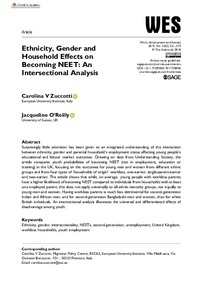Ethnicity, gender and household effects on becoming NEET: an intersectional analysis

Zuccotti, Carolina V. ; O'Reilly, Jacqueline
2019
33
3
June
351-373
youth unemployment ; ethnic factor ; gender ; household income
Young people and child labour
https://doi.org/10.1177/0950017017738945
English
Bibliogr.
"Surprisingly little attention has been given to an integrated understanding of the interaction between ethnicity, gender and parental household's employment status affecting young people's educational and labour market outcomes. Drawing on data from Understanding Society, the article compares youth probabilities of becoming NEET (not in employment, education or training) in the UK, focusing on the outcomes for young men and women from different ethnic groups and from four types of ‘households of origin': workless, one-earner, single-parent-earner and two-earner. The article shows that while, on average, young people with workless parents have a higher likelihood of becoming NEET compared to individuals from households with at least one employed parent, this does not apply universally to all ethnic minority groups, nor equally to young men and women. Having workless parents is much less detrimental for second-generation Indian and African men, and for second-generation Bangladeshi men and women, than for white British individuals. An intersectional analysis illustrates the universal and differentiated effects of disadvantage among youth."
Digital
The ETUI is co-funded by the European Union. Views and opinions expressed are however those of the author(s) only and do not necessarily reflect those of the European Union or the ETUI.